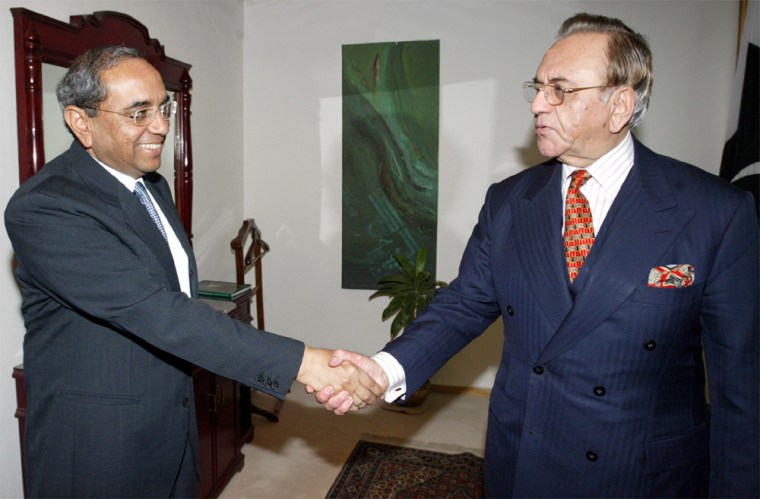Pakistan and India agreed Wednesday on an aggressively rapid plan for peace talks they hope will put a history of acrimony behind them, planning high-level meetings on contentious issues such as Kashmir, terrorism and nuclear weapons.
The dialogue will culminate with a summit in August between the two nations’ foreign ministers — a major breakthrough that would have been unimaginable two years ago, when the atomic adversaries stood on the brink of war.
“We hope that this road map will eventually lead to the settlement of all outstanding disputes between India and Pakistan and in the direction of durable peace,” Pakistani Foreign Secretary Riaz Khokhar told a news conference after the talks.
A series of midlevel meetings will begin directly after the Indian elections in April, including a discussion in May on nuclear confidence-building measures, and another in June to discuss ways to combat drug trafficking and smuggling.
Khokhar and his Indian counterpart, Shashank, will meet again in May or June in the Indian capital to discuss the divided Himalayan region of Kashmir, the central dispute in a half-century of animosity. The two are the top bureaucrats dealing with foreign policy. Shashank uses only one name.
Even before the Indian elections, talks will be held on transport links and other issues, Khokhar said. The exact dates for most of the talks have not been decided.
Shashank did not comment after the three-day talks. The Indian side barred all Pakistani journalists from a briefing held for Indian newspaper correspondents Wednesday evening.
In New Delhi, Foreign Ministry spokesman Navtej Sarna said both sides had a “sincere desire to discuss and arrive at a peaceful settlement of all bilateral issues, including Jammu and Kashmir.”
A moment of optimism
Khokhar urged patience but expressed optimism about the talks.
“We feel that the atmosphere is much better,” Khokhar said. “There is a realization on both sides that war is not an option.”
Since April, Pakistan and India have restored ambassador-level diplomatic ties and resumed bus, rail and plane service.
The agenda for talks reached Wednesday is similar to a plan first agreed to in 1997 that failed to make any headway. The plan calls for the two countries to set up eight groups to tackle Kashmir, nuclear arms, terrorism, drugs and trade, among other issues.
Pakistan and India nearly went to war in 2002, following an attack on India’s parliament that New Delhi blamed on Islamic militants and Pakistan’s intelligence agency. Pakistan denied the charges.
There are many obstacles ahead, though Indian Prime Minister Atal Bihari Vajpayee is expected to win the April vote and continue the dialogue.
Some worry whether Vajpayee, 79, and Pakistani President Gen. Pervez Musharraf, who survived two assassination attempts in December, can hold on to see the peace process through to conclusion.
The big sticking point
Kashmir is by far the most emotional issue, and both leaders face powerful forces opposed to a deal. Musharraf has angered Islamic militant groups by even coming this far, and they are believed behind the two attempts on his life.
The militants want to see all of predominantly Muslim Kashmir wrested from Indian control, either to create an independent state of become part of Pakistan. Neither outcome is likely.
Pakistan and India have fought two of their three wars since gaining independence from Britain in 1947 over Kashmir.
A cease-fire line divides the territory, but both claim it in its entirety. More than 65,000 people have been killed in an insurgency that has raged in Indian-controlled portions of the territory since 1989.
Musharraf announced the broad outlines of the road map in a speech to Islamic clerics Wednesday. He told the clerics that he would never sell out the Kashmiri people, but that a peaceful solution was a must.
“I am hopeful that a solution for Kashmir, in accordance with the wishes of Kahsmiris, will be found,” he said. “If there is no solution according to the wishes of Kashmiris then no solution will be found.”
The speech was greeted with shouts of “Long live Musharraf!” and “God is great!”
